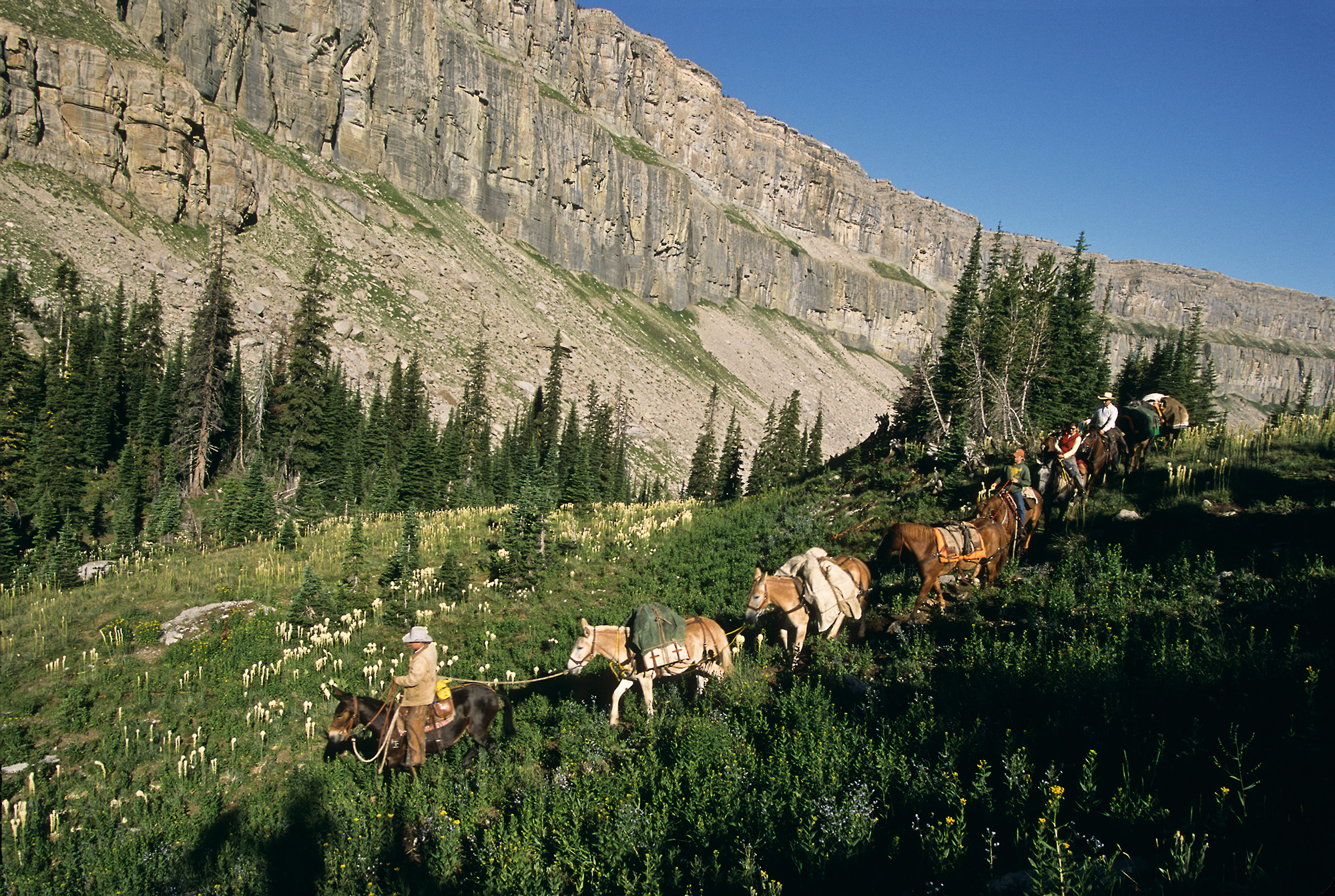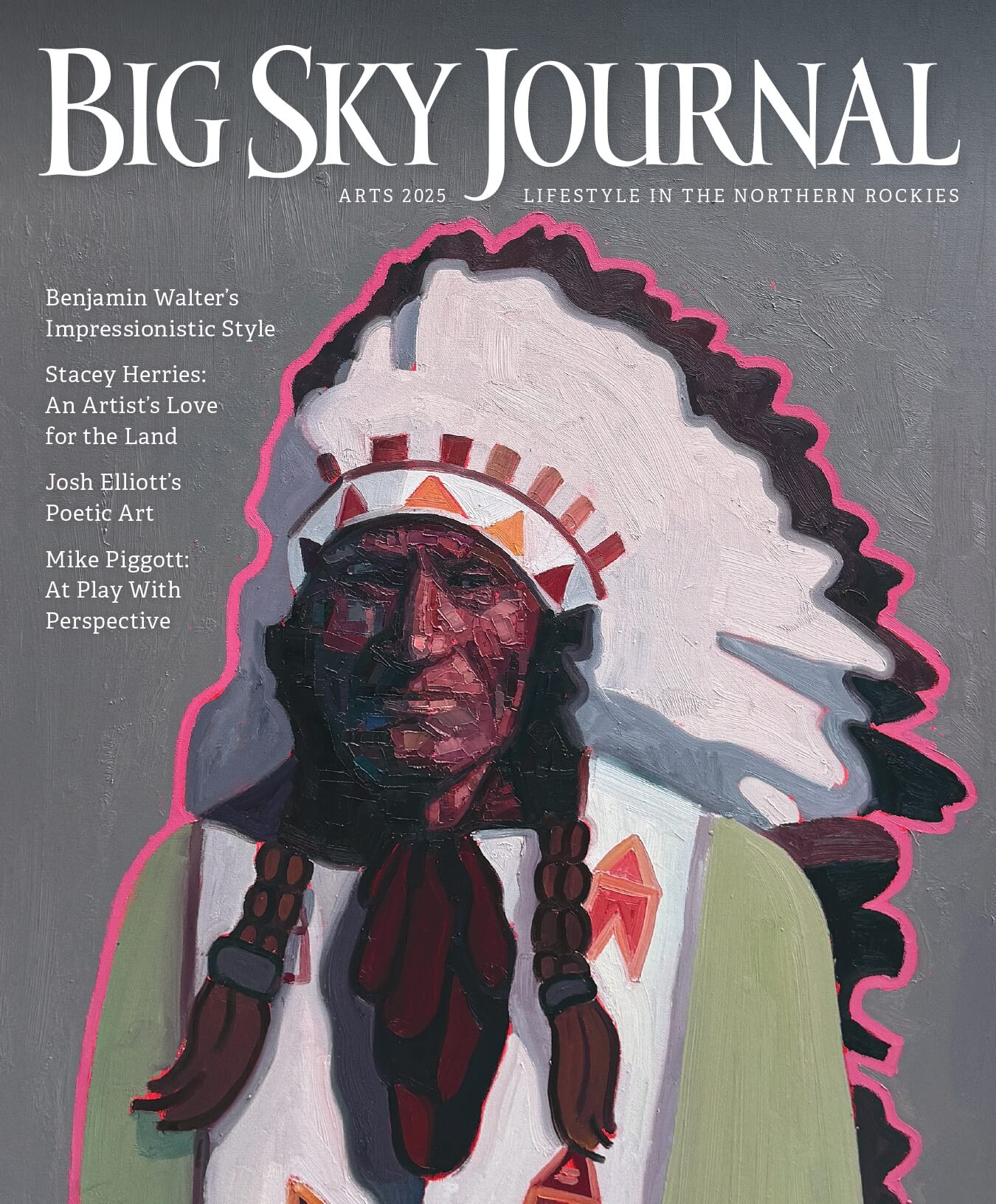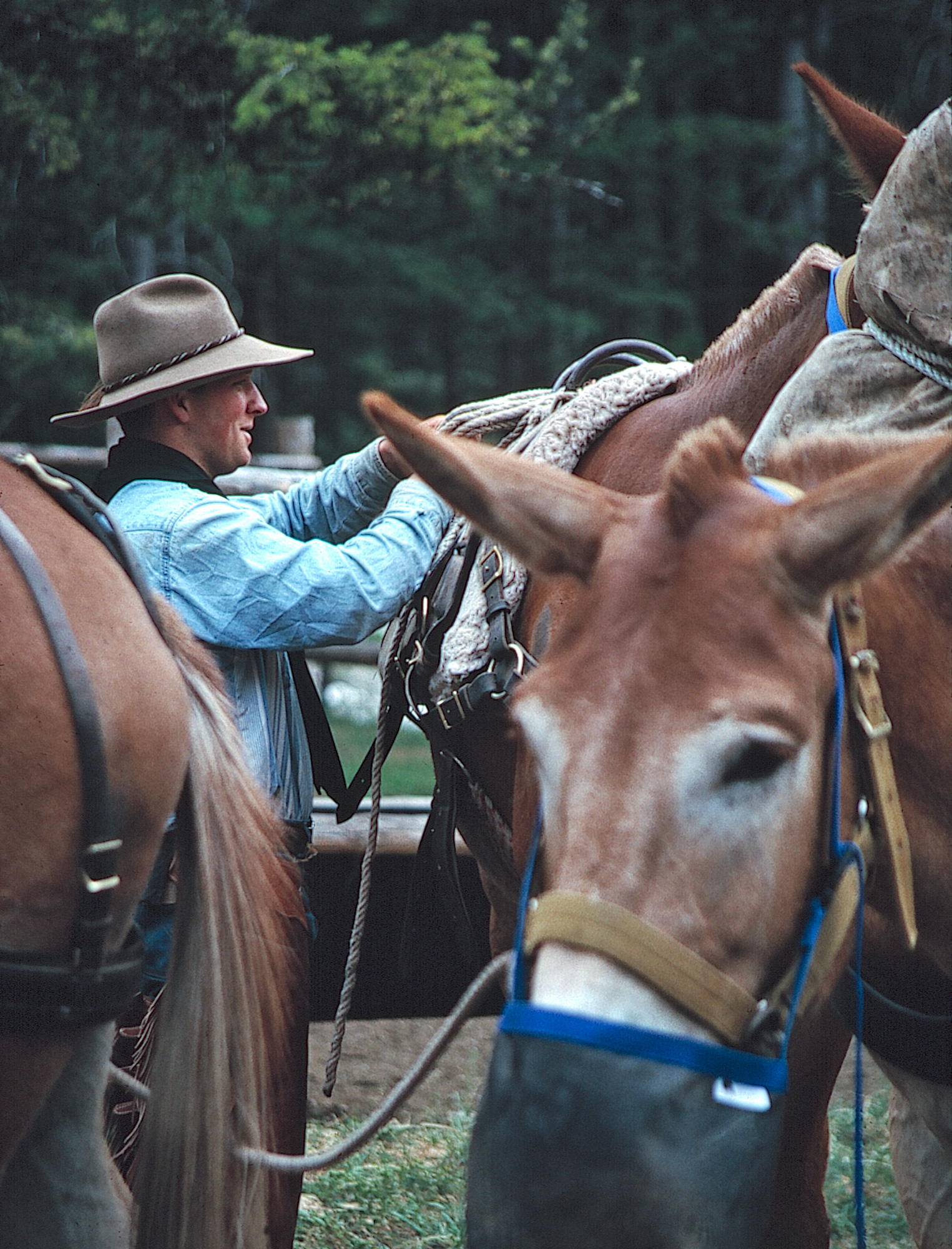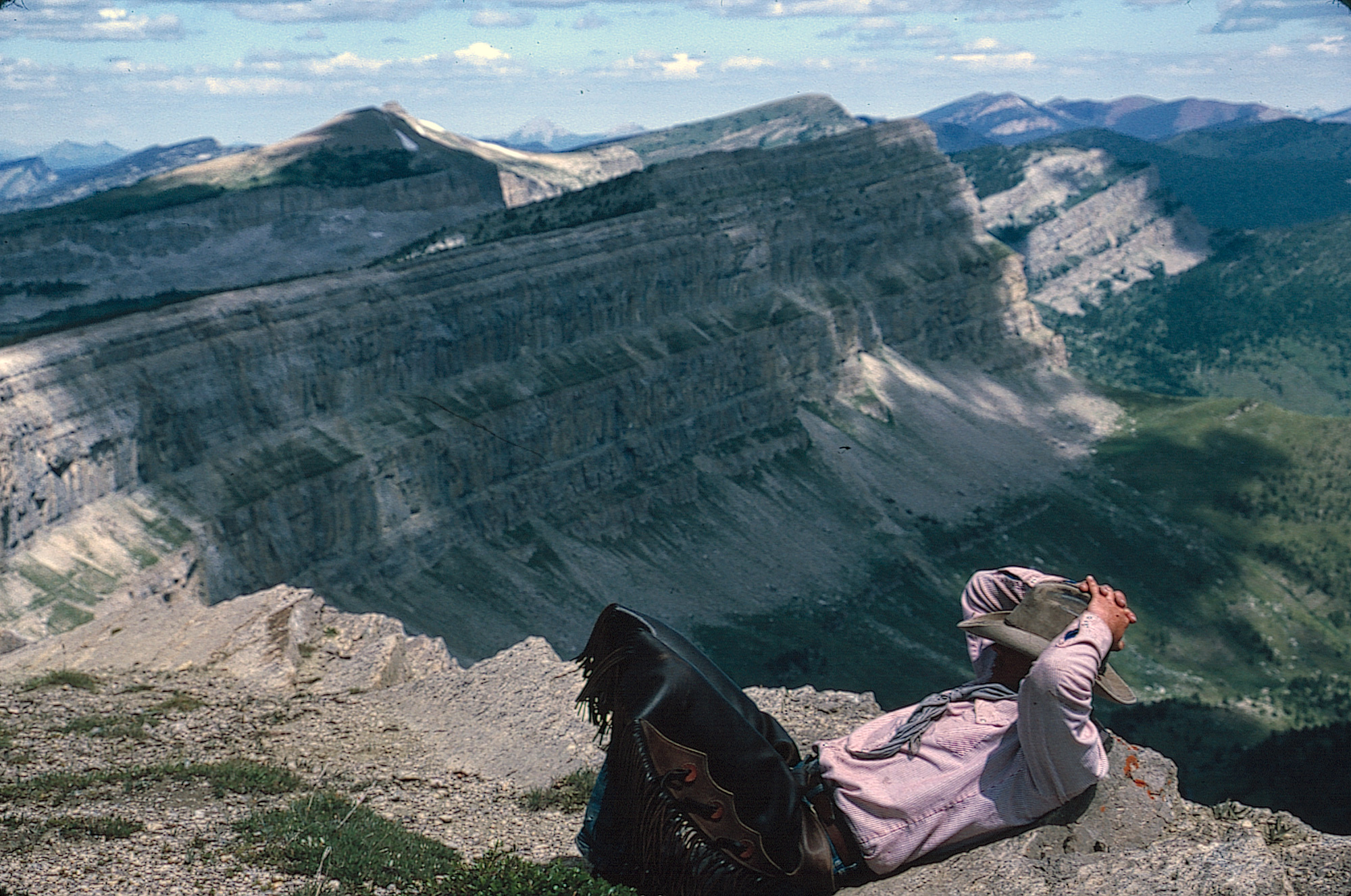
23 Jul Riding the Divide
THE YEARS, AS JOHN PRINE SANG IT, “just flow by, like a broken-down dam.” Your children are 4, catching hoppers on the bank while you cast for cutthroats, then they are 7, and fishing beside you, or 9, and following you on skis down a long snowslope in the hot April sun. You put the big trips off until the children are older, and suddenly, they are.
In July of 2010, my 10-year-old son Harold and I took a pack trip deep into the Bob Marshall Wilderness with Mills Wilderness Adventures, riding horseback from the trailhead up Benchmark, west of our home in Augusta, Mont., 25 miles or so across the Continental Divide to the upper White River. It was a journey that I’d always wanted to make, to pass through that fortress wall of mountains that is the ever-present backdrop to daily life in our town. With my wife and children I had wandered the outlier hills of the wilderness, hunted and fished the near valleys, climbed Ear Mountain and Steamboat. I’d gazed westward over that staggering expanse, but I’d never really been inside.
I’d done very little horsepacking in my day, hauling supplies to a wilderness hunting camp in return for rent on a crumbling house in the Bitterroots, and I’d told my son the stories of mule mutinies, elk, and big country seen from high in the saddle. When his buddy Turk Mills, age 11, told me there was room for us on a mid-summer trip into the Bob Marshall with his family’s packstring, I knew it was a chance that might not come again. We went.
As ecstatic as I was saddle-sore, we reined up and took a break at White River Pass, among the ivory-colored remnants of last years’ snows and thickets of limber pine and subalpine fir bonsai’ed and sculpted by relentless winds. There were eight of us: a couple from Texas who’d never been on a long horseback trip before, Steve and Susan Smith, from Helena, Mont., who’d been on some of the Mills’ expeditions in years past, my son Harold, Turk Mills, and myself. We were led by Turk’s mother Amy, a top-hand horsewoman and guide (and our neighbor in Augusta) for whom this country is a vast, demanding and beautiful second home. Our horses steamed in the chill of altitude, and caught their breath from the long switchbacked climb, thick veins showing like embossed maps of rivers on the sweat-slick skin of their shoulder muscles.
We’d ridden a strong half day along the upper forks of the Sun River, fording creeks still charged and frothing with meltwater from the high country, threading the long meadows spotted with gentian and white yarrow, Amy narrating the country for us from time to time (“This is where we saw the grizzly last summer. … That’s where the trail got taken out by an avalanche in 2007 … ”). Now, here on the great bare spine of the Continental Divide, the clouds that had threatened rain all morning were behind us, and below us, obscuring the view eastward to the plains. Westward, where we were headed, down that spectacular chasm that cradled the White River and carried it to the mighty Middle Fork of the Flathead, the weather was clear and warm. We took off down the trail again, me on foot and leading my horse Strawberry down the steeps to give us both a little break. Harold turned in his saddle to jeer at my geezery weakness. He and the rest of the iron-butted crew rode on.
A couple of hours and a few thousand feet of elevation loss later, we were riding the flats beside the torrent of the White River itself. A long whinny and bray from ahead marked the camp, a kind of green and well-watered Nirvana in a grove of towering Douglas fir and lodgepole. The corrals and white canvas sleeping tents and long hitch rails radiated out from a spacious central cook tent. As we dismounted, joints creaking as loudly as the leather of the saddles, Tucker Mills, Amy’s husband and the ramrod of the outfit, rode in at the head of a string of heavily loaded mules. Tucker has spent his life in these mountains, and has the look of a classic wrangler, with the arms and shoulders of a man who throws 90-pound sacks of alfalfa pellets into panniers before daylight several days a week, and does his own horse and mule shoeing, three and four animals a day sometimes, right here in the camp. “We had a little blow-up on the pass,” he says quietly to Amy, “but nothing too unusual.” Tucker’s father Ron Mills rode in from checking the rest of the horse herd in pastures high on Haystack Mountain behind the camp. At 70, Ron remains the quiet and intensely capable wrangler and hunting guide that he’s been almost all his life; although these days, he has to find a stump or rock to mount his horse — hip replacements don’t move like his originals did. He sleeps the short nights on a cot by a small aspen grove, with just a tarp to keep off the rain. “I really don’t like to be enclosed,” he tells me.
There have been Mills in this camp on the White River since 1959, when it was leased by an old-time outfitter named Art Weikum who hired both Ron and Ray to work for him. After a big supper one night of steaks and pan-fried potatoes and red velvet cake (all cooked by Amy on a propane stove) we sat later than usual and listened to the tales. Ron’s brother Ray had ridden in, too, along with Sid, a tough youngish man who’s been guiding for the Mills for years. Asked where he lives, Sid says he keeps a post office box in Pray, Mont.
“We had a full camp that first year,” Ray said, remembering 1959. “And they liked to sit here at the table at night and drink and play cards. They were wheat farmers and some oil and gas people from up near Shelby, and some guys from Minnesota. I remember at one time they were betting whole sections of land on a hand of cards.” I asked him if, with all that nightlife, they did any actual hunting. “Oh yeah. They were serious about the hunting, too. And it was good in here that year, I remember that.” Ron and Tucker trade stories of an extraordinarily eccentric camp tender that worked here for decades, who in his spare time built contraptions of bizarre genius to do everything from catching mice to hiding a little quickly-accessible liquor for himself. I asked what finally happened to this character. “He lived to be real old,” Tucker said, sadly. “And then he fell down an old well somewhere in Augusta.”
The days unfold in the camp from daybreak, the sun clearing the massive bulk of Haystack Mountain and eating the shadows away until it reaches the cook tent and the whole clearing is bathed in warm light. For the guests, there’s no hurry. Amy has been cooking since first light; Turk has built the fire; the wranglers have already gathered the day’s horses, and are saddling; Tucker is shoeing a mule, and the occasional ring of his hammer on the anvil sounds sharp and ancient in this wild and silent valley. There’s time to hike down to the river, if you want, and make a few casts for the big cutthroats that are invisible in the water — though it’s so clear that seems impossible — and suddenly appear behind your Adams or Stimulator like a bar of sunlight come to life, their colors so intense as to be almost unbelievable.
And, not too early, we ride. It’s not required. But we ride, because that is what the Mills do. We ride on a daunting bushwhack through black timber and rock to the snowfields above Diamond Lake, a place that redefines the very notion of isolation, and the place where the last legal grizzly bear was shot by a hunter in 1980. The wounded bear swam out into freezing Diamond Lake and died, and the guide, a young man from Augusta, became legendary for swimming naked out to the grizzly, which they could only assume was dead, tying a lasso around it, and pulling it to shore before it sank and was lost in the depths.
We ride to the cliffs above Needle Falls, where the White River becomes airborne through a cleft in the rocks and falls in spray to a deep pool that few people have ever fished. We ride through the elk-hunting country, learning the names of the staggering landmark peaks —Gladiator, Turtlehead, Terrace — and looking for bear and other big wildlife in the avalanche chutes, which are thicketed with chokecherry and serviceberry. We ride clear downriver to the Middle Fork of the Flathead, passing through White River Park, a huge table-flat land of open Ponderosa pines, giant trees with orange, vanilla-smelling bark, all of them scorched black from the passage of fires but still thriving. There’s rain and cold squall, then sun again, the mercurial weather of mid-summer in the high country.
We ride the long haul up Haystack Mountain, to the top of the Chinese Wall, where you could just barely see a small herd of resting elk sprawled out in a lush meadow beneath the yawning hang of the limestone wall, their sun-bleached hides small oblongs of yellow in the electric green grass. In this austere pale rock country, the meadows and forests below the wall are watered by the constant trickling melt from the huge snowbanks that we stand on, here on this summit, 1,000 or more feet above. Tucker shows us where he and some of his guests watched a wolverine leisurely digging up bugs among the flower-studded rocks just above timberline. We eat lunch on the roof of the world, our feet hanging off into space.
IT’S BEEN SOME MONTHS since we’ve been back home. I see Tucker and Amy most days, trailering horses, loading hay bales from the barn next door, making ready for next season. We ate a fine lunch with the Smiths one day. Harold and I have talked about the trip enough, looked long at the photos, and told the stories too many times, probably. “Hey, do you remember … ?” “Yeah, but what about when … ” “Can you imagine what it looks like there now, in the winter?”
We know something, the two of us, about the endless trails to those rivers, those wild fish rising in the morning sunlight, those good strong, sure-footed horses and mules, that no longer needs to be put into words.
- Left: Fording a stream. • Center: Hearty meals are prepared in camp each night to feed the hungry riders. • Right: Wall tents are set up as base camps for the guests to sleep in. Photos by Will Brewster
- Preparing for the ride, a wrangler saddles the mules.
- Preparing for the ride, a wrangler saddles the mules.







David Duvall
Posted at 22:44h, 08 JulyThank you for the wonderful description of your memorable trip. I’ll be heading out with the Mills in early August. Scouting it out to take my 9-year-old son in 2 years.. Nice to hear it is doable. 🙂